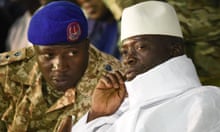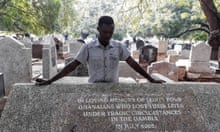Yahya Jammeh, the former Gambian president, has left the country after he finally agreed to step down following 22 years of rule.
Jammeh and his family headed into political exile on Saturday night, ending a 22-year reign of fear and a post-election political standoff that threatened to provoke a regional military intervention when he clung to power.
As he mounted the stairs to the plane, he turned to the crowd, kissed his Qur’an and waved one last time to supporters, including soldiers who cried at his departure.
The flight came almost 24 hours after Jammeh announced on state television he was ceding power to the newly inaugurated Adama Barrow, in response to mounting international pressure calling for his departure.
Though tens of thousands of Gambians had fled the country during his rule, Jammeh supporters flocked to the airport to see him walk the red carpet to his plane.
Jammeh landed in Guinea an hour later and members of his family emerged from the plane, though the country might not be his final destination.
The authoritarian leader took power in a 1994 coup – but stepped down in the face of pressure from west African armies that entered Gambia to force him to recognise that he lost an election in December to Barrow.
The Guinean president, Alpha Condé, and the UN’s regional chief, Mohamed Ibn Chambas, had remained in the capital and a regional force was positioned in the country, ready to move in if Jammeh changed his mind and refused to cede power.
Jammeh’s departure heralds the first democratic transition of power the Gambia has seen. Jammeh initially accepted defeat but later rejected the election result and declared a national state of emergency in an attempt to cling to power.
The streets were deserted in the small administrative capital that surrounds the presidential residence, where vultures amassed in the grounds. But nearby towns, Bakau and Serrekunda, were coming back to life.
Malick Njie, a young man selling T-shirts in the area of the city that has seen the biggest pro-Barrow celebrations in the past month, said: “Gambia has decided.
“I sold 200 this morning, and 1,500 yesterday,” he said, rustling in a large plastic bag full of banknotes for change. “Before, it was dangerous. We printed them and hid them.”
Fatou Minteh bought enough food for her family to survive for three weeks when she heard troops from the Economic Community of West African States were comingand they all hid at home. On Saturday morning, she was buying T-shirts for herself and her children.
“Three days ago, when you wore this you were arrested, but now we’re going to wear them to boot out the old president and welcome the new one,” she said.
“They say Gambia is divided, because the vote was split between him and Barrow, but his voters had three voting cards each. They voted three times. Gambia is not divided, we’re one people.”
Asitou Jallow, a traditional healer sitting on the pavement with her powders spread out in front of her, said Jammeh’s flip-flopping had hit her in the pocket. “It’s been very quiet these past few days, nobody’s been out, though I was here. I’ve lost a lot of money for food and rent in these days. But now, thank God, we’re seeing people come out again, now that Barrow is president.”
As well as mysterious bottles of brown liquid and shrivelled-looking bundles, on Saturday she had new wares on display. “Generally I sell herbal medicine but today I’m selling photos of Barrow too. I like Barrow, and Jammeh has stepped down. I was a Jammeh supporter, but what can I do?”
Many Gambians chatted about the future, discussing what they would like Barrow to do first as president. Human rights organisations followed suit. “Jammeh’s departure gives Gambia the chance to usher in an era based on respect for the rule of law and human rights,” said Jim Wormington, a west Africa researcher at Human Rights Watch. “Barrow has the opportunity to nurture an open society in which diverse opinions, including peaceful dissent, are recognised as crucial for building a better country.”
Barrow, still across the border in Senegal, said he would get to work immediately on rebuilding the Gambia’s economy and righting the wrongs of the past 22 years. “To all of you who were forced by political circumstances to flee the country, you now have the liberty to return home,” he said.
Most of the 45,000 people who have left the Gambia in recent weeks for fear of violence have stayed where they are for now, reluctant to move until they hear Jammeh has really gone. Banjul ferry, one of the main routes in and out of the city, was deserted.
Sheriff Bojang Junior, however, a journalist whose criticism of Jammeh’s government led to death threats that caused him to flee to Senegal, took Barrow at his word. He took a pirogue – a brightly painted wooden boat – across the Gambia river to his home city on Saturday morning and looked about him, disoriented in the place he left 15 years ago.
“I felt we are free. All I needed was Jammeh saying he resigned,” he said. “Even though I had security concerns, his legitimacy came to an end, so I’m not bothered. It would just be rebels disregarding the constitution that would harm me. Hey! Give me one of those in XL,” he broke off, calling to a man selling Gambia Has Decided T-shirts.







